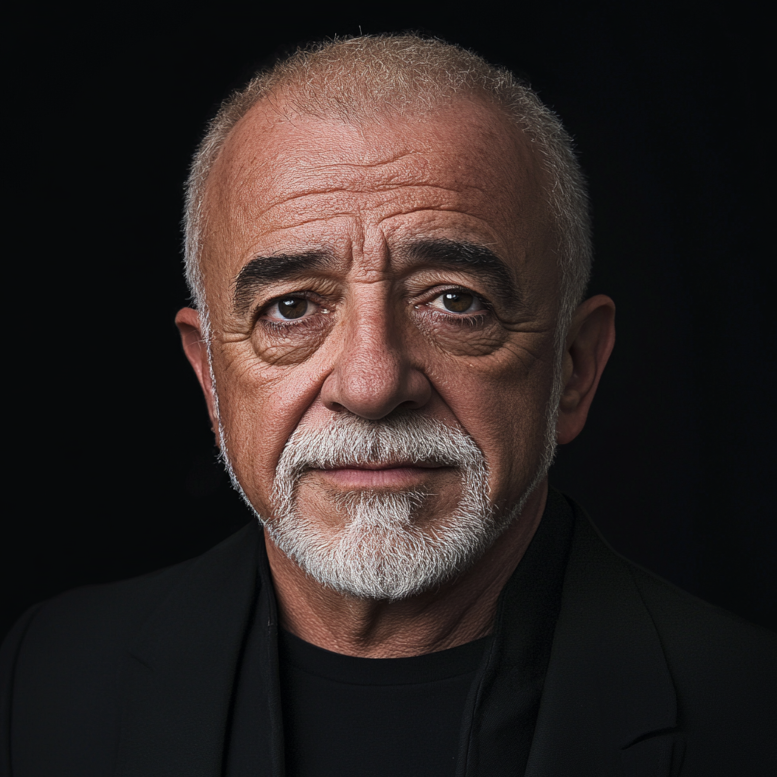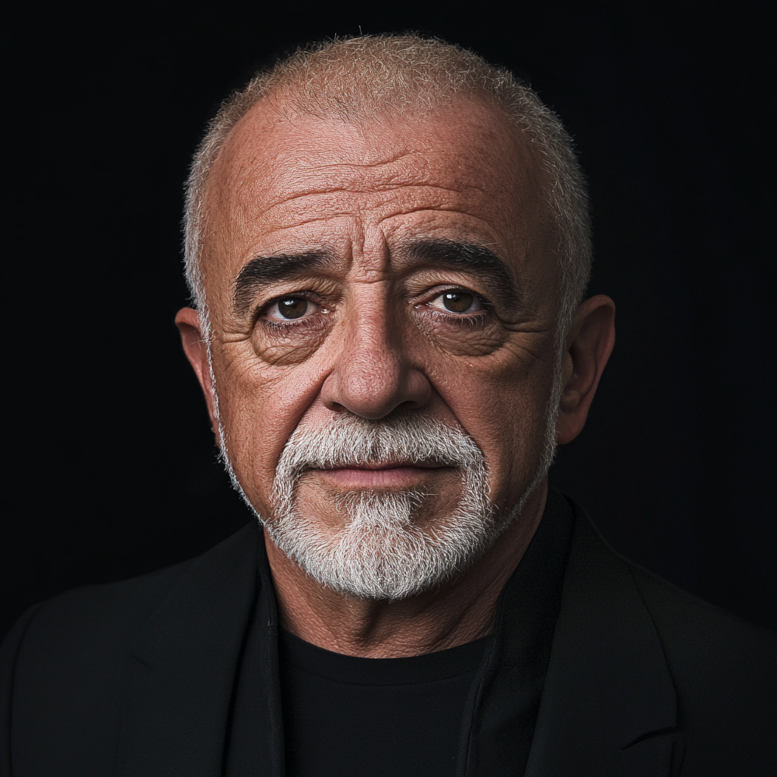


Paulo Coelho (born August 24, 1947) is a Brazilian author, lyricist, and novelist best known for his internationally acclaimed novel The Alchemist (1988), which has sold millions of copies worldwide and been translated into numerous languages. Coelho's work, characterized by its exploration of spiritual themes and personal growth, has made him one of the most widely read and influential contemporary authors. His books often focus on the individual's quest for meaning, the importance of following one's dreams, and the pursuit of spiritual enlightenment.
Birth and Family Background: Paulo Coelho was born in Rio de Janeiro, Brazil, into a middle-class family of Catholic descent. His father, Pedro Queima Coelho de Souza, was an engineer, and his mother, Lygia Coelho, was a homemaker. Coelho's parents were conservative, and his upbringing was marked by strict discipline and adherence to traditional values.
Rebellion and Institutionalization: Coelho's early years were marked by a struggle between his artistic inclinations and his parents' expectations. He expressed an interest in becoming a writer at a young age, but his parents discouraged this, believing that such a career was impractical. Coelho's rebellious nature led to conflicts with his family, and at the age of 17, he was placed in a mental institution by his parents, who were concerned about his unconventional behavior. Coelho was subjected to electroconvulsive therapy during his time in the institution, an experience that had a lasting impact on him.
Early Career and Counterculture: In the late 1960s, Coelho became involved in the counterculture movement, which was gaining momentum around the world. He embraced the ideals of freedom, creativity, and self-expression, and became active in the Brazilian music scene as a lyricist. He collaborated with famous Brazilian musicians, including Raul Seixas, and wrote lyrics for songs that became hits in Brazil. However, his involvement in the counterculture movement also led to run-ins with the authorities during Brazil's military dictatorship, and he was briefly imprisoned in 1974.
Early Writings and Journey to Spirituality: Coelho's early literary efforts were not particularly successful, but his life took a significant turn in 1986 when he embarked on a pilgrimage along the Road to Santiago, a route leading to the shrine of the apostle Saint James in northwestern Spain. This spiritual journey had a profound impact on Coelho and inspired much of his later work. It was during this pilgrimage that Coelho experienced a spiritual awakening, which solidified his commitment to writing and exploring themes of spirituality, destiny, and the pursuit of one's dreams.
The Alchemist (1988): The Alchemist is Paulo Coelho's most famous work and is considered a modern classic. The novel tells the story of Santiago, a young shepherd who embarks on a journey to find a hidden treasure, only to discover that the true treasure lies in understanding and fulfilling his personal legend, or life's purpose. The book's themes of self-discovery, the importance of following one's dreams, and the idea that the universe conspires to help those who pursue their personal legends resonated with readers around the world. Although The Alchemist initially had modest success in Brazil, it eventually gained international acclaim and became one of the best-selling books in history, with over 65 million copies sold.
Other Notable Works: Following the success of The Alchemist, Coelho wrote several other novels that explored similar themes of spirituality, destiny, and self-realization. Some of his other notable works include:
Spirituality and Mysticism: Paulo Coelho's writing is deeply influenced by his own spiritual beliefs and experiences. His novels often incorporate elements of mysticism, spiritual allegory, and philosophical inquiry. Coelho's works encourage readers to explore their own spirituality and to seek meaning and fulfillment in their lives.
The Hero's Journey: Many of Coelho's novels follow the archetypal "hero's journey," in which the protagonist embarks on a quest for self-discovery and transformation. This narrative structure, rooted in ancient myths and legends, resonates with readers across cultures and has contributed to the universal appeal of Coelho's work.
Simplicity and Accessibility: Coelho's writing style is characterized by its simplicity and accessibility. He uses straightforward language and avoids overly complex literary techniques, making his books easy to read and understand. This approach has helped Coelho reach a broad audience and has contributed to his popularity as a global author.
Global Reach: Paulo Coelho is one of the most translated authors in the world, with his books available in over 80 languages. His work has resonated with readers from diverse cultural backgrounds, and his books have been particularly popular in countries such as Brazil, the United States, Russia, China, and India. Coelho's universal themes of personal growth, spiritual exploration, and the pursuit of dreams have made him a beloved author worldwide.
Cultural Impact: Coelho's work has had a significant impact on popular culture and has inspired countless readers to reflect on their own lives and aspirations. The Alchemist in particular has become a cultural phenomenon, frequently quoted and referenced in various contexts, from self-help literature to motivational speeches. Coelho's ideas about following one's dreams and listening to one's heart have influenced not only literature but also personal development and spiritual practices.
Recognition and Awards: Throughout his career, Coelho has received numerous awards and honors for his contributions to literature and culture. These include the Crystal Award from the World Economic Forum, the Golden Book Award in Yugoslavia, and the Grand Cross of the Order of Saint James of the Sword in Portugal. Coelho was also inducted into the Brazilian Academy of Letters in 2002, recognizing his influence on Brazilian literature.
Engagement with Readers: Coelho has embraced the digital age and uses social media to connect with his readers. He has a significant online presence and frequently shares insights, reflections, and quotes from his work with his millions of followers on platforms like Twitter and Facebook. Coelho's openness and willingness to engage with his readers have helped him maintain a close relationship with his global audience.
Philanthropy: In addition to his literary work, Paulo Coelho is involved in various philanthropic efforts. In 1996, he founded the Paulo Coelho Institute, a non-profit organization that supports the elderly and underprivileged children in Brazil. Coelho is also a United Nations Messenger of Peace, a role in which he advocates for intercultural dialogue and understanding.
Paulo Coelho is a literary phenomenon whose works have touched the hearts and minds of millions of readers around the world. His exploration of spiritual themes, personal growth, and the pursuit of one's dreams has made him one of the most influential and widely read authors of our time. With The Alchemist and his other novels, Coelho has left an indelible mark on contemporary literature, inspiring readers to seek meaning and fulfillment in their own lives. His enduring popularity and cultural impact continue to make him a prominent figure in global literature.

We use cookies
We use cookies and other tracking technologies to improve your browsing experience on our website, to show you personalized content and targeted ads, to analyze our website traffic, and to understand where our visitors are coming from. Privacy Policy.